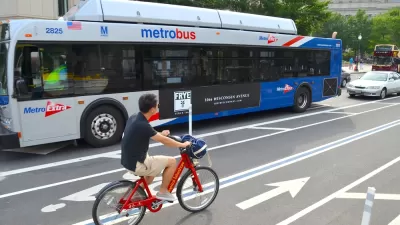The mode share for bikes in urban environments around the world currently sits around 6 percent. A new report out of a university located in one of the most bike-friendly cities in the country quantifies the benefits of 10 percent mode share.
Bobby Magill reports: "The climate would benefit in a big way if urban commuters worldwide would leave their cars at home and use those dedicated bike lanes to cycle to work, and if more cities would prioritize bike commuting in their urban planning, according to a University of California-Davis report [pdf] published Thursday."
More specifically: "Greenhouse gas emissions coming from motor vehicles in big cities worldwide would dive about 11 percent, saving society $24 trillion in infrastructure and other costs between today and 2050 if city dwellers would use bicycles and electric bikes for about 10 percent of their urban trips instead of using motor vehicles, the report says."
Magill quotes Lewis Fulton, co-author of the study, who says that the report is the first to quantify "the potential carbon dioxide and cost savings associated with a worldwide shift toward much greater use of cycling in urban areas."
Complicating the widespread adoption of biking in different cities are disparate funding, infrastructure, and cultural challenges. Kevin Krizek, director of the University of Colorado-Boulder’s Environmental Design Building program, is quoted in the article saying that "Bicycling has widely varying social connotations in some cultures and painting it as a silver bullet that is irrespective of these cultures leaves a lot of distance to cover..." The article surveys more acadmics, including those unaffiliated with the study, for their opinions on the feasibility of such an ambitious goal for mode share.
FULL STORY: Shifting Gears to Cycling Would be Big Climate Boost

Planetizen Federal Action Tracker
A weekly monitor of how Trump’s orders and actions are impacting planners and planning in America.

San Francisco's School District Spent $105M To Build Affordable Housing for Teachers — And That's Just the Beginning
SFUSD joins a growing list of school districts using their land holdings to address housing affordability challenges faced by their own employees.

The Tiny, Adorable $7,000 Car Turning Japan Onto EVs
The single seat Mibot charges from a regular plug as quickly as an iPad, and is about half the price of an average EV.

Seattle's Plan for Adopting Driverless Cars
Equity, safety, accessibility and affordability are front of mind as the city prepares for robotaxis and other autonomous vehicles.

As Trump Phases Out FEMA, Is It Time to Flee the Floodplains?
With less federal funding available for disaster relief efforts, the need to relocate at-risk communities is more urgent than ever.

With Protected Lanes, 460% More People Commute by Bike
For those needing more ammo, more data proving what we already knew is here.
Urban Design for Planners 1: Software Tools
This six-course series explores essential urban design concepts using open source software and equips planners with the tools they need to participate fully in the urban design process.
Planning for Universal Design
Learn the tools for implementing Universal Design in planning regulations.
Smith Gee Studio
City of Charlotte
City of Camden Redevelopment Agency
City of Astoria
Transportation Research & Education Center (TREC) at Portland State University
US High Speed Rail Association
City of Camden Redevelopment Agency
Municipality of Princeton (NJ)





























